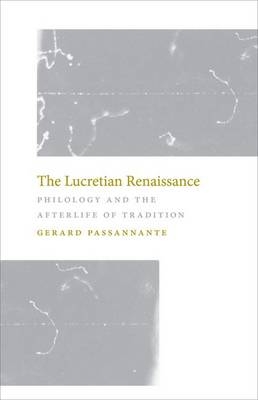
The Lucretian Renaissance
Philology and the Afterlife of Tradition
Seiten
2011
University of Chicago Press (Verlag)
978-0-226-64849-1 (ISBN)
University of Chicago Press (Verlag)
978-0-226-64849-1 (ISBN)
Begins by taking up the ancient philosophical notion that the world is composed of two fundamental opposites: atoms, as the philosopher Epicurus theorized, intrinsically unchangeable and moving about the void; and, the void itself, or nothingness.
With "The Lucretian Renaissance", Gerard Passannante offers a radical rethinking of a familiar narrative: the rise of materialism in early modern Europe. Passannante begins by taking up the ancient philosophical notion that the world is composed of two fundamental opposites: atoms, as the philosopher Epicurus theorized, intrinsically unchangeable and moving about the void; and, the void itself, or nothingness. Passannante considers the fact that this strain of ancient Greek philosophy survived and was transmitted to the Renaissance primarily by means of a poem that had seemingly been lost - a poem insisting that the letters of the alphabet are like the atoms that make up the universe. By tracing this elemental analogy through the fortunes of Lucretius' "On the Nature of Things", Passannante argues that the philosophy of atoms and the void reemerged in the Renaissance as a story about reading and letters - a story that materialized in texts, in their physical recomposition, and in their scattering.
From the works of Virgil and Macrobius to those of Petrarch, Montaigne, Bacon, Spenser, and Newton, "The Lucretian Renaissance" recovers a forgotten history of materialism in humanist thought and scholarly practice and asks us to reconsider one of the most enduring questions of the period: what does it mean for a text, a poem, and philosophy to be "reborn"?
With "The Lucretian Renaissance", Gerard Passannante offers a radical rethinking of a familiar narrative: the rise of materialism in early modern Europe. Passannante begins by taking up the ancient philosophical notion that the world is composed of two fundamental opposites: atoms, as the philosopher Epicurus theorized, intrinsically unchangeable and moving about the void; and, the void itself, or nothingness. Passannante considers the fact that this strain of ancient Greek philosophy survived and was transmitted to the Renaissance primarily by means of a poem that had seemingly been lost - a poem insisting that the letters of the alphabet are like the atoms that make up the universe. By tracing this elemental analogy through the fortunes of Lucretius' "On the Nature of Things", Passannante argues that the philosophy of atoms and the void reemerged in the Renaissance as a story about reading and letters - a story that materialized in texts, in their physical recomposition, and in their scattering.
From the works of Virgil and Macrobius to those of Petrarch, Montaigne, Bacon, Spenser, and Newton, "The Lucretian Renaissance" recovers a forgotten history of materialism in humanist thought and scholarly practice and asks us to reconsider one of the most enduring questions of the period: what does it mean for a text, a poem, and philosophy to be "reborn"?
Gerard Passannante is assistant professor of English and comparative literature at the University of Maryland.
| Erscheint lt. Verlag | 6.1.2012 |
|---|---|
| Sprache | englisch |
| Maße | 15 x 22 mm |
| Gewicht | 425 g |
| Themenwelt | Geisteswissenschaften ► Philosophie ► Philosophie Altertum / Antike |
| Geisteswissenschaften ► Philosophie ► Philosophie des Mittelalters | |
| Geisteswissenschaften ► Sprach- / Literaturwissenschaft ► Anglistik / Amerikanistik | |
| ISBN-10 | 0-226-64849-4 / 0226648494 |
| ISBN-13 | 978-0-226-64849-1 / 9780226648491 |
| Zustand | Neuware |
| Haben Sie eine Frage zum Produkt? |
Mehr entdecken
aus dem Bereich
aus dem Bereich
mit Sokrates, Seneca, Platon & Co. im Gespräch
Buch | Hardcover (2023)
FinanzBuch Verlag
CHF 25,20


